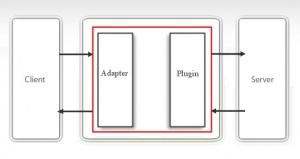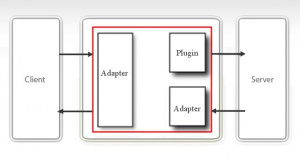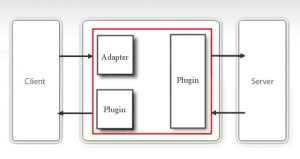Difference between revisions of "Paradigms of communication"
(→Synchronous-Asynchronous) |
(→Asynchronous-Synchronous) |
||
| Line 38: | Line 38: | ||
===Asynchronous-Synchronous=== | ===Asynchronous-Synchronous=== | ||
| + | [[File:ParadigmAS.jpg|thumb|Asynchronous-Synchronous]]The Asynchronous-Synchronous paradigm takes place following the Client -> {{GVESB}} -> Server direction. | ||
| + | |||
| + | |||
| + | The following table shows its properties: | ||
| + | {|class="gvtable" | ||
| + | ! !! Client !! GVESB Workflow Number !! Server | ||
| + | |- | ||
| + | | Communication || Asynchronous || 1 || Synchronous | ||
| + | |} | ||
===Asynchronous-Asynchronous=== | ===Asynchronous-Asynchronous=== | ||
Revision as of 17:27, 10 February 2012
Contents
Description
Depending on the type of communication (Synchronous / Asynchronous), on the role played by GreenVulcano® ESB (active / passive) and on the response management, it is possible to have from a minimum of one to a maximum of four operations constituting a single interaction client - server.
GreenVulcano® ESB Configuration
GreenVulcano® ESB is configured for managing four paradigms of communication:
- Synchronous - Synchronous
- Synchronous - Asynchronous
- Asynchronous - Synchronous
- Asynchronous - Asynchronous
Synchronous-Synchronous
The Synchronous-Synchronous paradigm takes place following the Client -> GreenVulcano® ESB -> Server direction.
The following table shows its properties:
| Client | GVESB Workflow Number | Server | |
|---|---|---|---|
| Communication | Synchronous | 1 | Synchronous |
Synchronous-Asynchronous
The Synchronous-Asynchronous paradigm takes place following the Client -> GreenVulcano® ESB -> Server direction.
The following table shows its properties:
| Client | GVESB Workflow Number | Server | |
|---|---|---|---|
| Communication | Synchronous | 1 | Asynchronous |
Asynchronous-Synchronous
The Asynchronous-Synchronous paradigm takes place following the Client -> GreenVulcano® ESB -> Server direction.
The following table shows its properties:
| Client | GVESB Workflow Number | Server | |
|---|---|---|---|
| Communication | Asynchronous | 1 | Synchronous |


